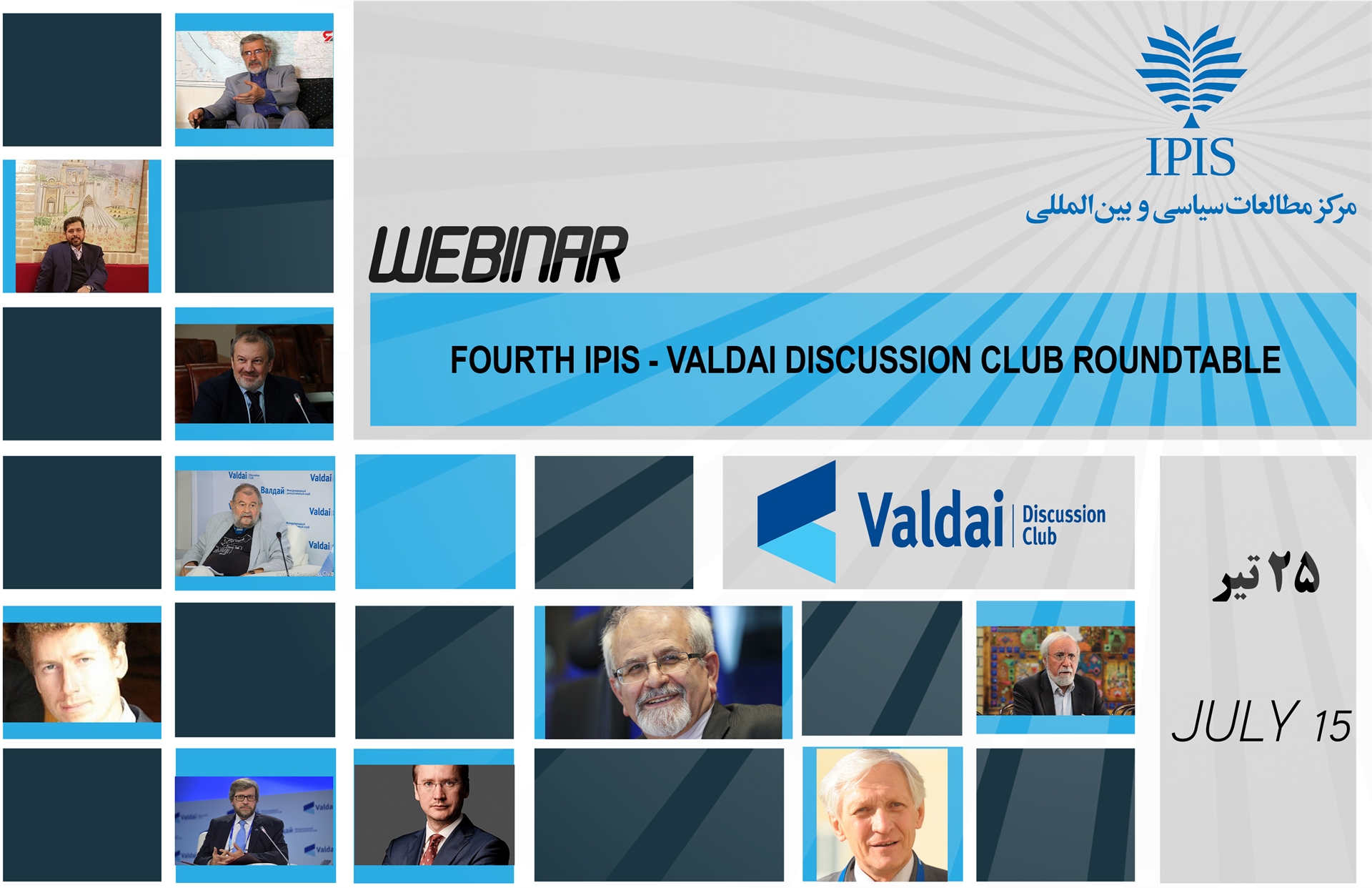Fourth IPIS - Valdai Discussion Club Roundtable
The fourth round of talks between the Institute for Political and International Studies (IPIS) and the Valdai Discussion Club was held via videoconferencing on Wednesday, July 14, 2020.

The fourth round of talks between the Institute for Political and International Studies (IPIS) and the Valdai Discussion Club was held via videoconferencing on Wednesday, July 14, 2020. The speakers at the online meeting were Seyed Mohammad Kazem Sajjadpoor, president of the IPIS; Saeed Khatibzadeh, IPIS Vice-President for Research; Kambiz Sheikh Hassani and Ali Akbar Jowkar, senior fellows at the IPIS; Mir Mahmoud Mousavi, Iran’s former ambassador to India and Pakistan; Sabah Zanganeh, Iran’s former ambassador to the Organization of Islamic Cooperation (OIC); Andrey Bystritskiy, chairman of Valdai Discussion Club; Vitaly Naumkin, director of the Institute of Oriental Studies at the Russian Academy of Sciences; Fyodor Lukyanov, research director of the Foundation for Development and Support of the Valdai Discussion Club; Andrey Baklitskiy, a consultant at the PIR Centre and analyst at the Institute of International Studies at MGIMO University; Konstantin Truevtsev, a senior researcher at the Institute of Oriental Studies at the Russian Academy of Sciences; and Aleksandr Aksenenok, vice-president of the Russian International Affairs Council.
The first part of the panel discussion revolved around the US foreign policy during Donald Trump’s tenure and its consequences, while participants in the second part discussed the bilateral relations and regional cooperation with the focus on Syria and Afghanistan, and answered the following questions:
- What are the likeliest scenarios regarding the United States' foreign policy within the next five months? Will the US decide to escalate the military crisis in the year when it is going to hold a presidential election?
- Will the trade agreement between China and the United States endure or would it only delay a new stage of strategic rivalry between them?
- What are the consequences of disagreement between Europe and the US over the implementation of the JCPOA?
- What are the possible scenarios about Iran-Russian relations in the wake of the new developments? What are the main challenges and opportunities facing their relations? What are the potential grounds for closer mutual cooperation?
- How can Iran and Russia cooperate to thwart the US’ unilateral sanctions against them?
- What are the latest regional developments and the potential grounds for cooperation between the two countries, with the focus on Syria and Afghanistan?
The main discussions held in the online meeting were as follows:
The coronavirus pandemic is the major challenge that many nation- states are facing at present. The problems caused by the crisis have resulted in instability in the political, economic, and social spheres, which have aggravated the previous problems in the countries. The move by certain actors in the international system to politicize the coronavirus outbreak in order to take advantage of the geopolitical competition has paved the way for a reduction in international cooperation. Iran and Russia, two neighboring states in Eurasia and West Asia face common interests and threats. The US’ presence and intervention in those regions have resulted in the formation of a mutual understanding of threats to them. Such mutual understanding has led to widespread cooperation between the two countries in the political, military, and economic spheres at the bilateral, regional, and international levels. However, this would not translate into a lack of differences between them in those fields.
The instability and challenges over the past ten years in Syria, Afghanistan, Iraq, Kashmir, and Yemen are among the most important problems that the regional countries, particularly Iran and Russian, are facing with. The supports that Iran and Russia have offered for a strong central government in Syria and its territorial integrity reveal the importance they attach to regional stability and security. Apart from Syria, the issue of Afghanistan is also one of the challenges that not only threatens the security and stability of the West Asia regionbut also poses a challenge to the security of the other countries and regions. The only way to ensure stability and security in Afghanistan is collective cooperation among the influential actors in those crises. The policy of unilateralism adopted by certain countries for the settlement of problems will not only not bring about security and stabilitybut would escalate instability and insecurity in the countries and regions, an example of which was obvious in the Doha meeting between the US and the Taliban.
The recent developments in the international relations, Donald Trump’s failures in the foreign policy arena, and his administration’s withdrawal from the international treaties and a number of international organizations have given him an inappropriate position ahead of the US presidential election in the current situation. It appears that the trade agreement between China and the US will be temporary. The US’ illegal withdrawal from the JCPOA, the imposition of sanctions against Iran and Russia, and its attempts to extend the arms embargo on Iran are examples of Trump’s symbolic moves to gain advantages ahead of the presidential election in order to secure a win over his election rival, Joe Biden. Polls have shown that the chances of winning the upcoming presidential election have moved in favor of Biden. Trump’s plummeting popularity in the US may force him to look for new foreign policy adventurism in the West Asia region and the Persian Gulf. In such circumstances, Iran and Russia, in cooperation with the regional countries, must handle the situation to restrain Trump from taking any adventurous move in the region.